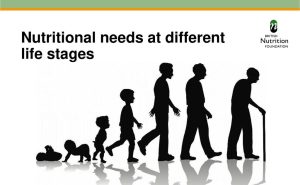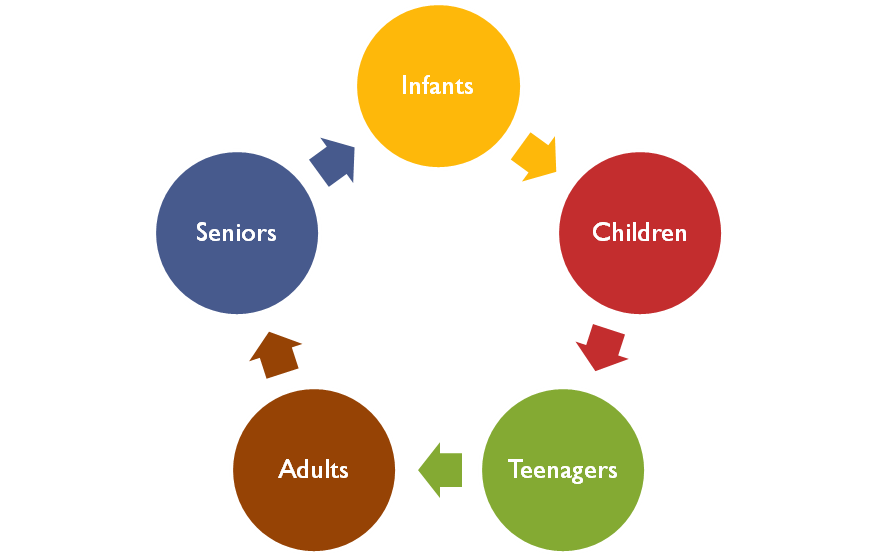TABLE OF CONTENTS
- INTRODUCTION
- WHY GOOD NUTRITION IS IMPORTANT DURING EARLY CHILDHOOD DEVELOPMENT?
- WHAT ARE THE NUTRITION CONCERNS FOR ADOLOCENCE?
- WHAT NUTRIENTS ARE IMPORTANT FOR OLDER ADULTS?
- CONCLUSION
- FREQUENTLY ASKED QUESTIONS
- REFERENCES
INTRODUCTION
Nutrition plays a crucial role across the lifespan impacting physical health, mental well-being, and overall quality of life.
KEY POINTS HIGHLIGHT THE IMPORTANCE OF NUTRITION IN DIFFERENT STAGES 
- EARLY DEVELOPMENT(INFANCY AND CHILDHOOD)
.FOUNDATIONS OF GROWTH: proper nutrition during infancy and childhood is vital for physical and cognitive development.
. ESTABLISHING HABITS: early exposure to a variety of nutritious foods helps set the stages for lifelong healthy eating habits.
- ADOLESCENCE
.PUBERTY AND GROWTH: Adequate nutrients, especially calcium and iron are essential during adolescence for growth spurts and development.
ESTABLISHING A NUTRITIONAL RELATIONSHIP WITH FOOD: Nutrition choices during adolescence can impact long-term attitudes towards food and health.
- ADULTHOOD
Energy and productivity: Nutrient-dense diets support optimal energy levels, productivity, and overall well-being in young adults.
.Disease prevention: proper nutrition contributes to the prevention of chronic diseases such as heart disease, diabetes, and obesity.
- MIDDLE AGE
.Metabolic Health: As metabolism changes with age, a balanced diet helps maintain a healthy weight and prevent metabolic issues.
.Bone health: Adequate calcium and vitamin D become crucial for maintaining bone density.
- SENIORS
.Nutrient absorption: Aging can affect nutrient absorption making nutrient–dense foods even more critical.
.Preventing malnutrition: proper nutrition helps prevent malnutrition in the elderly, contributing to longevity and overall health.
- COMMON THEMES ACROSS LIFESPAN:
.Cognitive function: Nutrient-rich diets support cognitive function and may reduce the risk of cognitive decline.
.immune system support: A well-balanced diet strengthens the immune system, aiding in preventing illnesses.
.Mental health: Nutrition impacts mental health, with certain nutrients playing a role in mood regulation and cognitive function.
In summary, nutrition is a lifelong factor that influences growth, development, health maintenance, and disease prevention at every stage of life. Adopting healthy eating habits early on and sustaining them throughout life contributes to a longer, healthier, and more fulfilling life.
WHY GOOD NUTRITION IS IMPORTANT DURING EARLY CHILDHOOD DEVELOPMENT?
Good nutrition in early childhood is crucial for several reasons as this period lays the foundation for lifelong health and well-being.
REASONS WHY GOOD NUTRITION IS IMPORTANT IN EARLY CHILDHOOD DEVELOPMENT:
- PHYSICAL GROWTH

Proper nutrition supports the rapid physical growth that occurs during early childhood. Essential nutrients such as proteins, vitamins, and minerals are vital for developing bones muscles, and organs.
- BRAIN DEVELOPMENT
The early years are a critical period for brain development. Nutrients like omega-3 fatty acids, iron, zinc, and vitamins play a key role in the formation of neutral connections and overall cognitive function.
- IMMUNE SYSTEM SUPPORT
Adequate nutrition strengthens the immune system, helping young children resist infection and illnesses. This is particularly important during early childhood when the immune system is still developing.
- ENERGY FOR PLAY AND LEARNING
Nutrient–dense foods provide the energy needed for active play and exploration. Good nutrition supports physical activity and helps children engage in learning experiences, contributing to cognitive and social development.
- ESTABLISHING HEALTHY HABITS
Early childhood is a critical time to establish lifelong eating habits. Introducing a variety of nutritious foods during the period can shape preferences and attitudes toward healthy eating, reducing the risk of nutritional deficiencies and related health issues later in life.
In summary, good nutrition in early childhood is essential for physical growth, cognitive development, immune system support, and lifelong healthy habits. Providing a balanced and nutritious diet during this critical period sets the stage for optimal health and well-being throughout a child’s life.
WHAT ARE THE NUTRITIONAL CONCERNS FOR ADOLESCENCE? 
Adolescent and teenage nutrition is crucial for supporting the rapid growth, development, and unique nutritional needs during this transitional phase.
KEY CONSIDERATION FOR ADOLESCENT AND TEENAGE NUTRITION :
- CALORIC NEEDS
Adolescents often experience a significant growth spurt, requiring increased caloric intake to support the development of muscles, bones, and other tissues.
- PROTEIN INTAKE
Adequate protein is essential for muscle development, especially during periods of physical activity and sports involvement that are common during adolescence.
- CALCIUM AND VITAMIN D
Bone growth is at its peak during adolescence, making calcium and vitamin D crucial for bone health and the prevention of osteoporosis later in life.
- IRON REQUIREMENTS
Teenage girls, in particular, may have increased iron needs due to the onset of measurement. Iron is vital for preventing anemia and supporting overall energy levels.
- HEALTHY FATS
Essential fatty acids such as omega-3s, support brain development and cognitive function. Incorporating sources like fatty fish, nuts, and seeds is beneficial.
- HYDRATION
scent often engages in physical activities that increase fluid needs Staying well-hydrated is essential for overall health and optimal performance.
- BALANCED NUTRITION
Encouraging a balanced diet that includes a variety of fruits, vegetables, whole grains, and lean proteins helps ensure adequate nutrition intake.
- MINDFUL EATING
Promoting mindful eating habits, such as paying attention to hunger and fullness cues, helps establish a healthy relationship with food and prevents issues like overeating or restrictive eating.
- LIMITING ADDED SUGARS AND PROCESSED FOODS
Limiting the intake of added sugars and processed foods supports overall health, helps maintain a healthy weight, and reduces the risk of chronic diseases.
- NUTRITION EDUCATION
Providing nutrition education empowers teenagers to make informed choices about their diets, fostering a sense of responsibility for their health.
In summary, addressing the unique nutritional needs of adolescents and teenagers involves a balanced and varied diet that supports growth, development, and overall well-being. Encouraging healthy eating habits during this critical period lays the foundation for a lifetime of good nutrition.
WHAT NUTRIENTS ARE IMPORTANT FOR OLDER ADULTS?
Older adults have specific nutritional needs to support aging-related changes and promote overall health.
Here are key nutrients that are particularly important for older adults:
- CALCIUM AND VITAMIN D
Essential for maintaining bone health and preventing osteoporosis. Calcium is found in dairy products, leafy greens, and fortified foods while vitamin D can be obtained from sunlight and supplements.
2. VITAMIN B12
Vital for neurological function and the production of red blood cells. Older adults may have decreased absorption, making b12-rich foods like meat, fish, eggs, and fortified cereals important.
3. FIBER
Aids in digestive health helps prevent constipation and may contribute to heart health. Whole grains, fruits, vegetables, and legumes are good sources of fiber.
4. OMEGA-3 FATTY ACIDS
Support heart health and may have anti-inflammatory properties. Fatty fish(like salmon and mackerel), flaxseeds, and walnuts are good sources.
Older adults must consult with healthcare professionals or registered dietitians to determine their nutritional needs.
CONCLUSION:
In conclusion, understanding and prioritizing nutrition across different life stages is paramount for overall health and well-being.
FREQUENTLY ASKED QUESTIONS:
QUESTION: WHAT ARE THE KEY NUTRIENTS FOR A GROWING CHILD, AND HOW CAN PARENTS ENSURE THEIR CHILD GETS A BALANCED DIET?
Growing children need a mix of nutrients, including vitamins, minerals, proteins, and carbohydrates. parents can ensure a balanced diet by offering a variety of foods, including fruits, vegetables, whole grains, lean protein, and dairy.
QUESTION: HOW CAN PARENTS ENCOURAGE HEALTHY EATING HABITS IN CHILDREN TO PREVENT NUTRITIONAL DEFICIENCIES?
Encourage a positive food environment, involve children in meal preparation, and be role models for healthy eating. offering a variety of nutrient-rich foods helps prevent deficiencies.
QUESTION: ARE THERE SPECIFIC FOODS THAT SUPPORT COGINITIVE DEVELOPMENT IN CHILDREN?
Foods rich in omega-3 fatty acids, iron, and antioxidants can support cognitive development.
QUESTION: WHAT ROLE DOES HYDRATION PLAY IN A CHILD’S OVERALL WELL-BEING, AND HOW MUCH WATER SHOULD THEY DRINK?
Hydration is crucial for overall health. children should drink an age-appropriate amount of water, with general recommendations ranging from 4 to 8 cups per day, depending on age.
REFERENCES :
1. https://books.google.co.in/books?id=hbCgDgAAQBAJ&source=gbs_book_other_versions
2.https://books.google.co.in/books?id=zIlSEAAAQBAJ&source=gbs_book_other_versions
